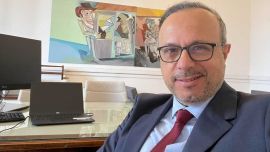Female bonding has never enjoyed the same focus as male – whether because there is actually less or because it exists on an equal scale but is quieter and more informal than the boisterous masculine variety bolstered by strong club traditions. Whatever the verdict here, it can be stated quite categorically that even though Argentina’s Security Ministry is the only portfolio with female continuity, following the transition between the Mauricio Macri and Alberto Fernández presidencies (with three women in Macri’s original 20-strong Cabinet and four female ministers now), there is no gender bonding between its past and present ministers – Patricia Bullrich and Sabina Frederic. To put it mildly.
Frederic is the choice for today’s third column in this ministerial series because despite the overwhelming urgency of economic issues (whose ministers will ideally await a more decisive moment) she has triggered news buzz recently. Two weekends ago she was drawing “friendly fire” from her Buenos Aires provincial counterpart Sergio Berni defending the Taser stun guns introduced by Bullrich from Frederic’s general drive to overturn her predecessor’s policies. And all the coverage of last Saturday’s fifth anniversary of the death of AMIA special prosecutor Alberto Nisman naturally included Frederic’s insistent proposal to review the Border Guard (Gendarmerie) inquest defining that death as murder (first made late last year and also questioned by Berni, as well as prompting a Civic Coalition call for Frederic’s impeachment).
The two women not only clash philosophically but also in their life stories. Bullrich started out as a rich kid walking on the wild side (the second syllable of her surname is no accident with the family fortune dating back five generations to auctioneering and banking in the 19th century) – a Montonero guerrilla and sisterin-law of Rodolfo Galimberti no less – before successively becoming a Peronist deputy, a Labour minister dubbed “La Piba” and also the “only man in the Cabinet” within the somewhat spineless administration of the Radical Fernando de la Rúa (1999-2001), back in Congress as a vehemently anti-Peronist deputy in Elisa Carrió’s Civic Coalition and finally Macri’s Security minister, tough on crime while extending the benefit of the doubt to her security forces.
In contrast, the CV of Sabina Andrea Frederic, 54, could be summarised by just two words “CONICET anthropologist” without missing too much. Nor has she undergone any of her predecessor’s bewildering ideological fluctuations – always a progressive and previously aligned with the left-wing Peronist Frente Grande, she was one of the many absorbed by the strong Kirchnerite drive to co-opt progressive circles. Not a total newcomer to the public sector with a couple of minor posts under her belt – a Defence Ministry undersecretary for military training (2009-2011) and a Security Ministry advisor (2012-2014). We might add such details as a middle-class upbringing in Lomas de Zamora (southern Greater Buenos Aires), a doctorate from the venerable Dutch university of Utrecht and half a dozen publications (half of these co-authored and often touching on political and security issues) but she remains essentially the social anthropologist, clearly belonging to the vice-presidential rather than presidential wing of the ruling coalition.
In any case this series aims at shedding light on the ministries rather than the ministers. Apart from the brand-new portfolios created last month, the Security Ministry is about as new as they come in Argentina – it will not even complete its first decade until this coming December. Historically policing was always the province of the Interior Ministry until 1989 when it was transferred to the Justice Ministry (apart from a 1999-2002 interlude). With crime ever a concern in Argentina (not least this summer with British tourist Matthew Gibbard shot dead in Puerto Madero last month), the casual observer could be forgiven for assuming that this portfolio was created to add an extra edge to crime-fighting but in fact the original intention was the precise opposite – to put a lid on police brutality after the four deaths resulting from the clearance of squatters from the Parque Indoamericano in Villa Soldati, just two days prior to the ministry’s creation. In this sense Frederic could be described as truer to the original spirit of this ministry than Bullrich.
Curiously enough, ever since the ministry’s birth in late 2010, Argentina’s “top cop” has always been a woman apart from six months (former Santa Cruz Peronist governor Arturo Puricelli in the second half of 2013). The first minister was Nilda Garré with María Cecilia Rodríguez coming after Puricelli, while Bullrich under the 2015-2019 Macri presidency and Frederic complete the quintet so far. Another curiosity is that none of these ministers stem from the mainstream ruling party of the day but rather coalition allies. Thus both Garré and Frederic are identified with Frente Grande and Rodríguez with the Nuevo Encuentro Kirchnerite splinter while Puricelli was enlisted in traditional PJ (Partido Justicialista) Peronism rather than the Victory Front. Bullrich had her own party under various labels (Unión por Todos, Unión por la Libertad), not joining Macri’s PRO until March, 2018.
These five ministers do not tell the whole story, however. The ministry might have been born out of outrage over the Parque Indoamericano slayings as a gesture towards the human rights organisations backing Kirchnerism, but as from 2012 the tail was wagging the dog in the form of Berni as deputy minister – an Army lieutenant-colonel on leave with very basic ideas about law and order. As president during the first half of this ministry’s life, Cristina Fernández de Kirchner’s attitude was complex – while her preferred role was as godmother of human rights, her antagonistic relationship with the Judiciary sometimes led her to accuse judges of being soft on crime and unleash Berni. Despite Bullrich’s incredibly variegated political career, her approach was much more linear, as was Macri’s support, with the focus always on crime (especially drug-trafficking, even if over 85,000 arrests only seems to scratch the surface) with a xenophobic tinge and unstinting support for the security forces sometimes over the top.
The ministry’s future hangs in the balance. The challenge is also conceptual – will it return to its original aims of disciplining the police or is Bullrich’s move back to the basics of crime-fighting irreversible? Will Frederic become embroiled in highly politicised cases like the deaths of Nisman and Santiago Maldonado or will she answer Bullrich at her own level of basic crime-fighting, verifying her generally upbeat data on less murders, kidnaps, etc. (some of which have been questioned by Chequeado fact-checkers) and improving crime maps? And, after that Taser spat, the most immediate question might be: Will the real minister please stand up, Frederic or Berni?



















Comments